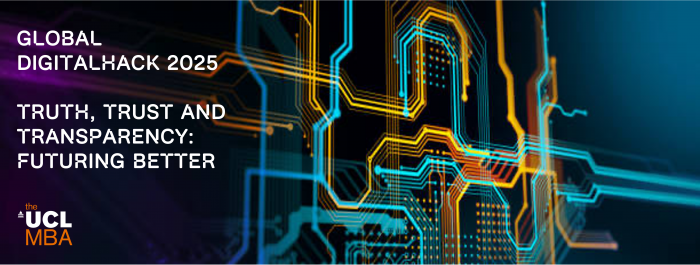
Last week, the UCL MBA hosted its fourth annual Global DigitalHack event, bringing together a dynamic mix of industry professionals, experts, technologists, entrepreneurs and academic faculty from across industry sectors for a high-impact, fully virtual innovation experience. This year’s theme, “Futuring Better with Truth, Trust and Transparency,” invited participants to explore how organisations can build more ethical, inclusive, and resilient futures through strategic innovation and digital- and AI-led transformation.
The Global DigitalHack 2025
The Global DigitalHack is a virtual and global team event that enables diverse teams to address critical societal challenges at a rapid pace. Dr Rikke Duus and Dr Mike Cooray are the architects of the DigitalHack and deliver this online event.
The DigitalHack 2025 welcomed participants from a wide range of industries and sectors, including technology, healthcare, media, fashion, and education. Professionals from organisations, such as Microsoft, TikTok, NHS, Burberry, Gartner, The Telegraph, and Nordisk Film joined forces with UCL MBA students and alumni to form interdisciplinary teams. This diverse mix of perspectives created a rich environment for collaborative problem-solving and future-focused thinking.
UCL MBA alumnus Matt Gascoigne reflected on the experience:
“The STRIDE innovation process was super helpful to support our rapid innovation. The insight from the group was amazing, and the support from the Digital Pioneers was excellent. The topics were relevant and well considered, and the pace was just right.”
Each team is supported by a high-performing UCL graduate, known as a Digital Pioneer. The DigitalHack offers a unique opportunity for these talented individuals to collaborate closely with industry professionals, UCL MBA students and alumni, and academic faculty. This immersive experience gives them exposure and boosts their confidence, whilst highlighting why organisations need to actively bring young people who have the digital competences into their innovation processes.
Tackling complex challenges with the STRIDE Innovation process
The DigitalHack is structured around the STRIDE innovation methodology developed by Dr Mike Cooray, Dr Rikke Duus, Jo Carmichael and Marius Sylvestersen. The methodology guides teams through six key stages of innovation from horizon scanning, to ecosystem design to implementation planning.
Over the course of the event, teams were challenged to explore how organisations can embed truth, trust, and transparency into their operations, services, and stakeholder relationships. Using digital tools and AI-enabled platforms, participants conducted trend analysis, mapped stakeholder ecosystems, and developed future scenarios to inform their innovation strategies.
UCL MBA student Charlotte Drache-Lambert shared her team’s journey:
“It was an intense innovation sprint tackling real-world challenges through digital innovation. Using the STRIDE framework, my team developed TTitan Heart, which is an AI-powered platform to help prevent cardiovascular disease. Great teamwork, real learning, and a refreshing reminder of what focused collaboration can achieve in just a few hours.”
Designing for impact and integrity
Each team developed a comprehensive innovation blueprint that included a future vision, a digital ecosystem map, and a strategic roadmap for implementation. The solutions addressed a wide range of issues from misinformation in media and ethical AI in healthcare to the future workforce and enhanced delivery of elderly care services.
Reflecting on the experience, UCL MBA student Elliotte Jacobs said:
“It was one of the most fulfilling projects I have worked on. The design and facilitation were outstanding and I feel this has greatly expanded outcomes that will shape my career.”
The event culminated in impressive presentations, showcasing the teams’ creativity, strategic thinking, and commitment to designing solutions that prioritise truth, trust and transparency to create better futures.
A platform for lifelong learning and leadership
DigitalHack 2025 exemplifies the UCL MBA’s mission to develop leaders who can navigate complexity and drive meaningful change. By combining academic rigour with real-world application, the event offers participants a unique opportunity to sharpen their innovation skills, expand their professional networks, and contribute to shaping a better future.
Reflecting on the event, Dr Rikke Duus said: “DigitalHack is more than just an innovation challenge. It’s a platform for critical thinking, collaboration, and action, enabled through the effective use of digital- and AI-platforms and tools. DigitalHack creates an opportunity for industry professionals, experts, technologists, entrepreneurs and academic faculty to collaborate in interdisciplinary teams to embrace the challenge of designing futures that are not only technologically advanced, but also ethically grounded. I am looking forward to DigitalHack 2026!”